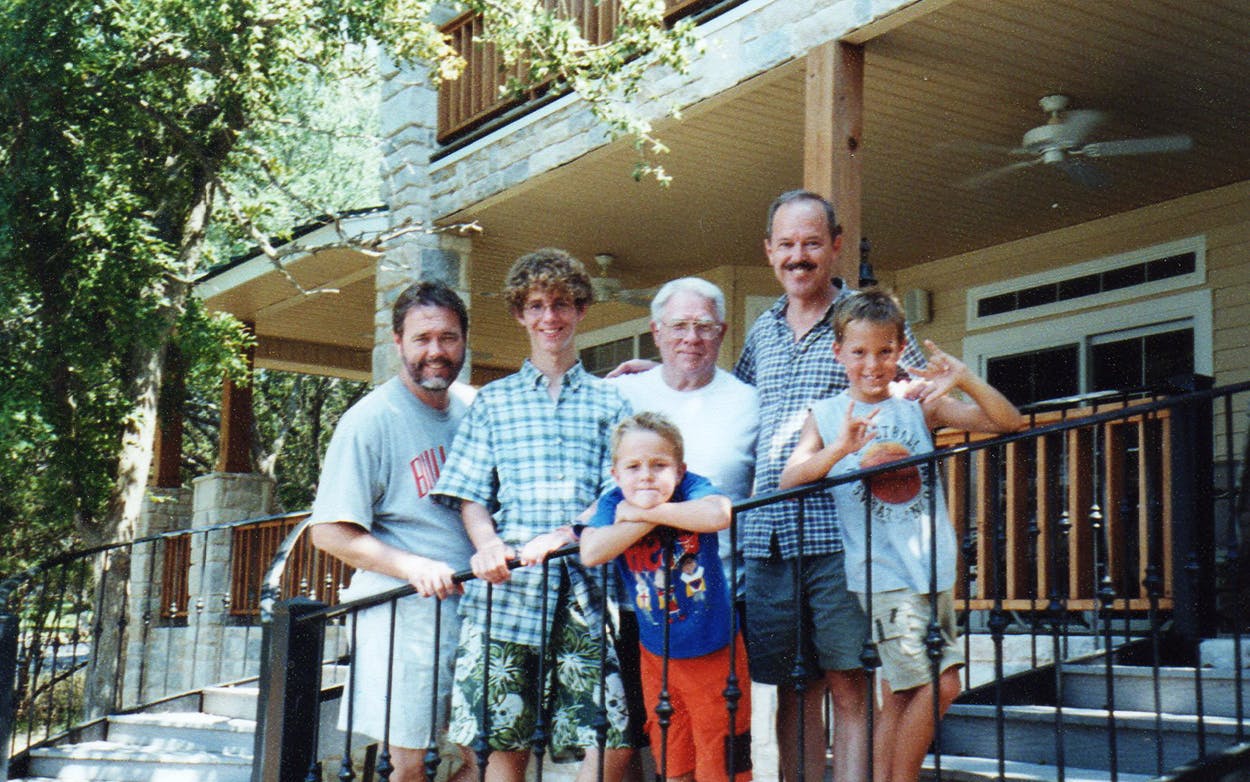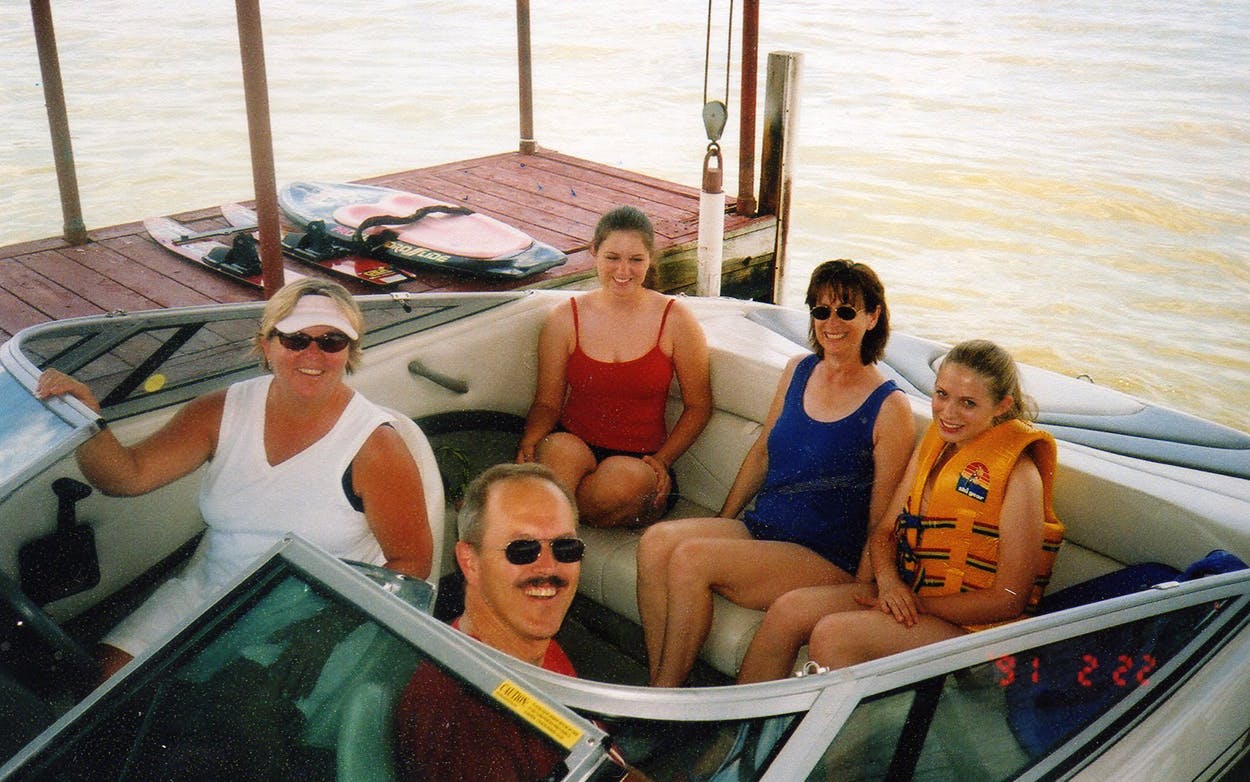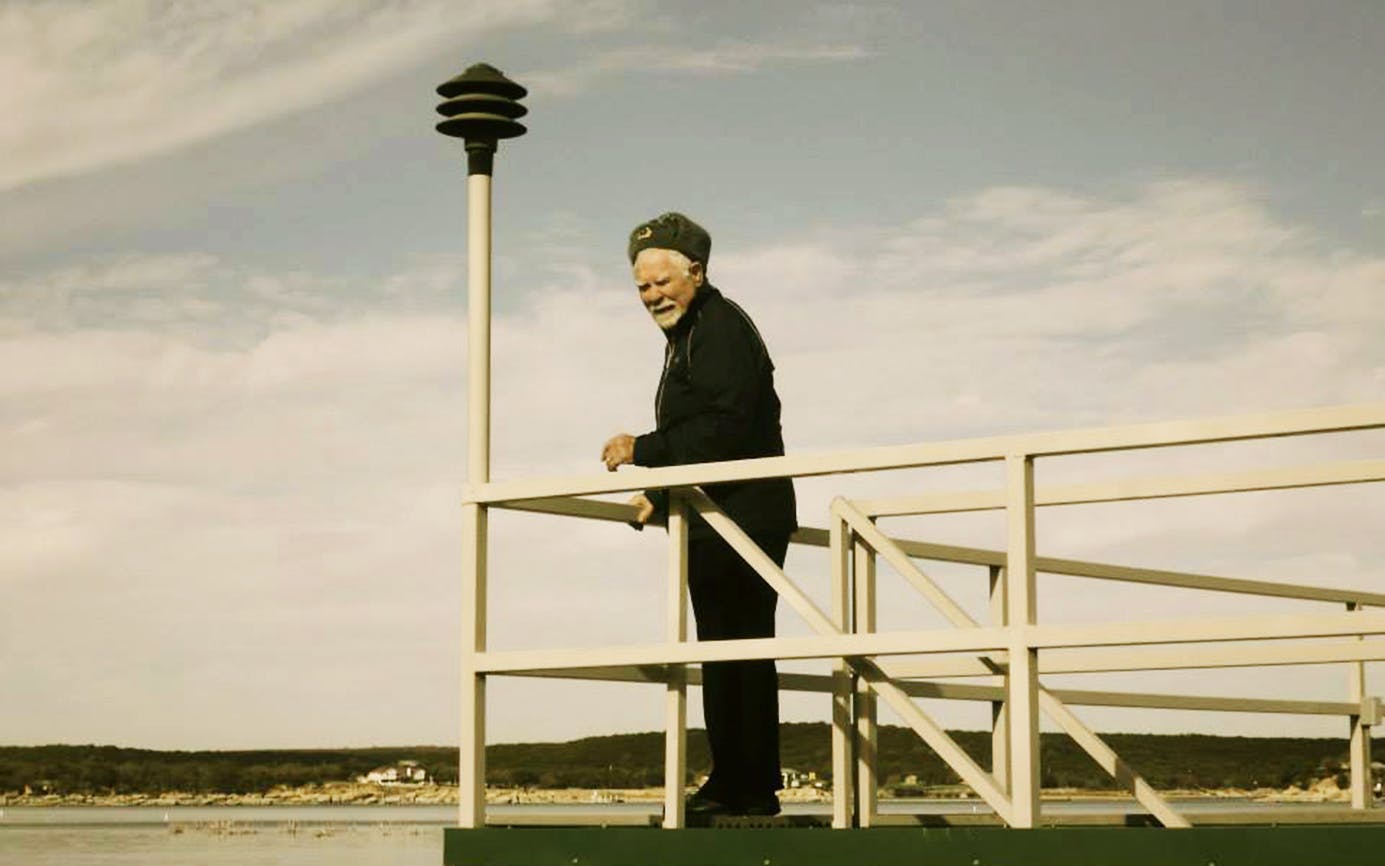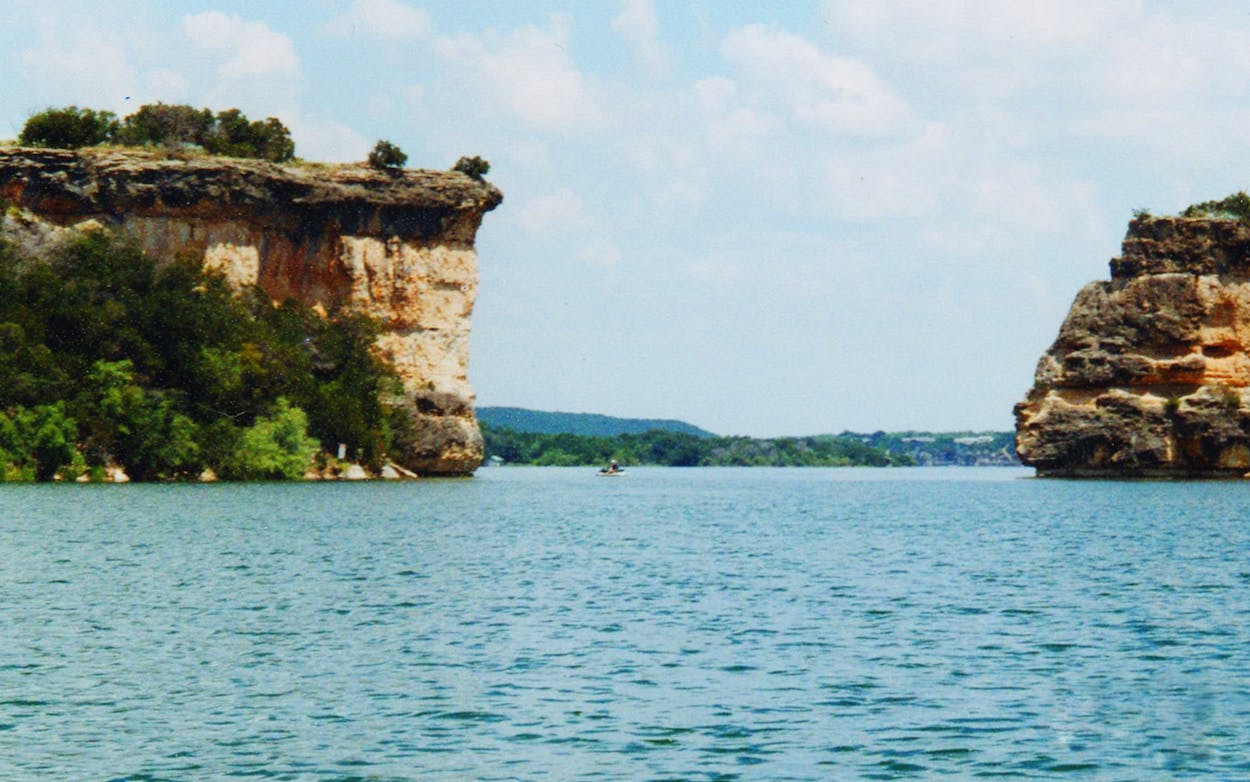As I loaded up on groceries near Stephenville, I paused to watch as a blanket of white grew thicker on the ground around me. I’d gotten a late start on my drive up from Austin, and when I got back in my dad’s car, I was apprehensive about my ability to navigate the snaking roads from Mineral Wells to Possum Kingdom Lake in the encroaching darkness under a rare Texas snowfall. By the time I pulled up to the front gate of my uncle’s lake house, I could barely see.
I grew up on the East Coast—my siblings and I broke the chain of a four-generation Texan family—and after college, I moved to Austin, where I felt like an outsider. Without a car in a car-reliant city, I had difficulty finding work and quickly ran out of money. The underemployment of my early twenties plunged me into a deep depression, and when I felt I had nowhere to turn, I drove to my uncle’s lake house, built on land my family has been connected to for generations, hoping to finally find some answers. I went to Possum Kingdom Lake alone to disconnect, to think and to pray, to read and to journal, to try to relax. I had no idea that my retreat would be far from peaceful.
My family’s connection to the oasis in the Palo Pinto Hills spans decades. PK, as it is known colloquially, was my dad’s Walden. In the late sixties, he went on his first overnight camping trip there, with Boy Scout troop 57. The kid from Garland, who grew up in cookie-cutter subdivisions set on tortilla-like plains, was hooked by the craggy cliffs, honey mesquite trees, and Ashe juniper–patched limestone hills. He returned as a camp staffer for three summers, spending his days on the water and his evenings tucked into his box tent on the shore. Several years later, he returned with my mother, driving out to the lake in her ’54 Chevy pickup to go camping. After hiking for a while, my dad told her to shimmy up the pinnacle of rocks at Johnson’s Peak, the highest point at the lake, for a panoramic view of the reflective teal water from up high. Then he asked her to marry him.


My dad’s younger brother, my Uncle John Paul, was equally enamored of the sprawling, secluded lake town, which he also first encountered on a Scout trip. The renovated lake retreat where I sought solace was originally a small fishing cabin he and my aunt bought early in their marriage to provide an escape from Dallas on the weekends. When my sister married her high school sweetheart, they took themselves on a budget honeymoon to the lake; their big adventure was shutting themselves out of the house and having to pick the lock to resume their blissful holiday. The top deck of the bi-level dock was one of the last places I saw my grandfather before he passed away, looking like an innocent Wes Anderson character in his Russian shearling sheepskin hat and worry lines, standing on the edge of the lake he had first fished in as a young man. PK has been an off-the-grid city dwellers’ retreat for generations of my family.
My own PK memories take me back to preteen summers zipping around on Jet Skis. But I also remember sneaking sips of dry white wine while cooking, delving into The Brothers Karamazov, and moping around sullenly. Even the idyll of the lake couldn’t trump the angst of a restless, perfectionist teenager.
When I turned to PK that February, my life—lacking mobility, regular income, access to food, and a consistent place to sleep—no longer felt bearable. I didn’t imagine the lake would solve my current predicament; it certainly hadn’t fixed my less troubling teenage woes. But maybe the familiarity of the lake, with its place in my family’s history, had the power to soothe.

PK exists in lore beyond that of my family. There’s the Toadies’ creepy 1994 hit single, “Possum Kingdom,” which was inspired by the macabre stories lead singer Todd Lewis heard around the lake as a kid. PK has a brighter claim to fame too: Since 2009, Red Bull’s annual cliff diving competition has drawn thrill-seeking crowds to Hell’s Gate, an abrupt break in the cliffs around the lake. Divers free-fall from the iconic thirty-meter cliffs that measure almost three times the Olympic diving platform height. Spectators could be described as Boston Harbor boat bros meets Fort Lauderdale booze cruisers—clad in bikinis and boardshorts, they raise Bud Lights in koozies as they watch adrenaline junkies tumble through the air, hollering encouragement from kayaks, canoes, and novelty unicorn floaties.
Even outside the energy-drink circuit, Hell’s Gate is known as a rowdy yacht-party hangout, famous to Texas boaters for its towering twin cliffs. The abridged legend of Hell’s Gate features a fur trade gone wrong. In Texas’s wilder days, two shifty fur traders doing commerce with Native Americans got them drunk on whiskey and stole their superior furs. They didn’t get far before their victims sobered up and tracked them down. One of the traders swore he’d go through the gates of hell before giving back the stolen furs. When he met his arrow-ridden demise along with his partner, they gave their holdout spot its eerie name: Hell’s Gate.
The name Possum Kingdom comes from local lore too. According to the July 21, 1941, minutes of the Brazos River Conservation and Reclamation District Board of Directors, residents spurned naming the lake after former Texas senator Morris Sheppard, who they felt was an elitist—“a Yale graduate and Shakespearean scholar.” The locals wanted a name that better fit the area’s wild residents: Mexican buckeye shrubs growing upside down on the cliffs, horny toads squirting blood from their eyes, and an abundance of furry marsupials, which had provided food and pelts to the area’s settlers.
In contrast to the crowds at other lakes in the DFW area, weekend warriors journeying a little farther west to PK have historically been rewarded with a genuine reprieve from the hubbub; when my uncle and his wife purchased their six-hundred-foot fishing cabin 29 years ago, it was affordable for newlyweds looking for a budget-friendly escape from the big city. But Possum Kingdom has experienced the slow burn of gentrification. The lake now boasts two resorts: The Cliffs, a gated community with private villas, a spa, and its own golf course, and Lush Resort, where guests can book custom massages and sip frozen piña coladas inside private, thatched beach pods. They’re a far cry from the modest homes of its previous snob-shunning, pro-possum residents.

Some folks, like Kevin VanDuser, are as tied to Possum Kingdom’s history as its eponymous marsupial. He moved to the lake after becoming a fixture at Camp Constantin, where he was program director in the sixties and seventies. VanDuser knew my father and uncle as campers, and he’s been a PK evangelist, historian, and self-described lake rat ever since, seeing the lake through its floods, droughts, wildfires, and newfound popularity.
VanDuser knows he got in at a good time. He owns his home, and he’s not going anywhere—he and his wife have built out guest rooms that are filled nearly every weekend by relatives who want to visit Uncle Kevin and relax. But middle-class newcomers won’t find it easy to put down a bid on a place at PK these days. The median listing price for a home on the lake is now $285,000, according to the Fort Worth Star-Telegram. After the drought-fueled 2011 Texas wildfires destroyed over 160 homes in Possum Kingdom, homeowners rebuilt larger houses; property values and taxes have risen, and what was once a weekender’s retreat is becoming a crowded year-round destination and second home to many from prosperous Dallas–Fort Worth and the surrounding areas.
“What I’m trying to survive is what they call the gentrification of PK Lake,” says VanDuser. “It was every man’s lake, but it’s kind of become a rich man’s lake. I got in ahead of the curve. I’m rich just because I get to live here. That’s how I see it.”
Lots of kids still get butterflies when they spend the summer at PK for the first time, at YMCA’s Camp Grady Spruce or Camp Constantin. Generations of campers, including VanDuser, my dad, and my uncle, developed a lifelong devotion to the area thanks to those formative experiences. It’s where they first tied a clove hitch knot, made a friendship bracelet, and experienced their first taste of independence out in the great wide open. Camp Constantin was the anchor that got my family to PK and has surely been the entry point for many other families on the lake too.
Then there are the birders and nature enthusiasts who don’t own property at the lake but appreciate it for its public access points (and 280-plus bird species), who celebrated when the Brazos River Authority added sixteen miles of hiking and biking trails between 2006 and 2010. There are also the teen and twenty-something visitors snapping group shots peppered with red cups and champagne bottles for Instagram. And, of course, there are the dads in baseball caps who just want a big fish story to tell. The lake is many things, depending on who you ask. On my solo expedition, I’d hoped it would provide respite from my tenuous life in Austin, but that wasn’t what Possum Kingdom had in store for me.
My second night at the lake house, I sat on the guest room bed, oscillating between sobbing into my hands and vacantly staring at the wall. Though I’d pulled the bathroom door shut, it couldn’t drown out the sound of running water flooding the bathtub, keeping me awake well past the witching hour.
That afternoon, after ending things by text with an increasingly distant friend and shutting off my phone, I thought a late-afternoon soak would be the perfect way to forget my emotional turmoil and wind down for the evening. Yet when I turned the faucet handle to run a bath, the loose fixture broke off, leaving a tiny, unmovable stub.
All my attempts to twist the knob with my fingers proved futile. I grew more agitated, my fingers pinched pink and tender, discarded tools strewn beside me: a mangled fork, a spoon, jumper cables, soaked towels. There was a toolbox in the shed outside, but its lock stood firm when I entered the code. The water main was not responding to my attempts to shut it off, and the snow came down hard and angry.
As I sat in bed to the sound of the rushing water around 4:30 a.m., I wrote in my journal: “Does it really get better? If you keep trying and trying and trying and trying with everything you have, does it really eventually work out, or is that just what people tell you because they don’t know what else to say?” I wasn’t writing about the ever-filling bathtub. I was writing about the flooding feelings it had brought to the surface: a dream of being able to pay rent, buy groceries, and earn a living wage.
That night of wailing and panic wasn’t what I had envisioned from my trip. I had hoped for serenity and a plan. I had imagined that, staring out at the snow-cloaked dock and limp rope swing, I would suddenly get a clear vision of how to finally land a real job and find a room I could somehow afford with the $200 in my bank account. I knew before I embarked on the journey that the lake itself didn’t have answers for me, but like so many before me, from Henry David Thoreau to my dad, I had felt the allure of searching for solace in the wilderness.
But through those exhausted, hysterical hours, I gained something else: the realization that I was never going to give up. Even though I felt like I was at my rock bottom, I knew that I didn’t get to succumb. I was resilient. A few hours later, after the sun rose, I drove to the Trading Post, the only grocery store on Possum Kingdom Lake, and bought the pliers I needed to turn the bathtub faucet and quell the high water.

When I drove away from PK, I still had a lot to get through. I was unsuccessfully applying for dozens of full- and part-time jobs every week, working unsustainable, low-wage odd jobs, sleeping on couches, completely dependent on others for food and transportation in the meantime. That cycle would continue for over a year. But my time at the lake had given me the faith that I would find a path forward through my desperado years. Possum Kingdom Lake hadn’t freed me from my problems, but it had shown me—as it had shown generations of young people before me—that I was capable. I hadn’t fixed the faulty faucet right away, but I had figured it out. That’s a version of freedom too.






